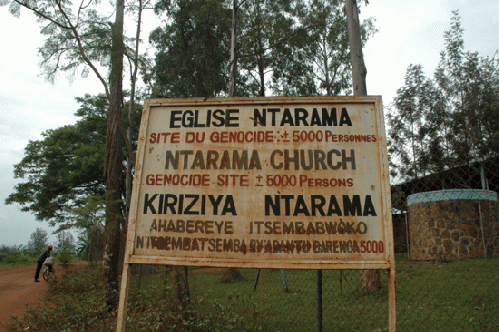(Article changed on August 22, 2013 at 20:26)
Imagine that you are a Congolese woman, now living in the European Union. Your father was from Bas Congo and your mother was born in Buisha in eastern Congo. You are Congolese in body and soul, and studied in Rutshuru, Goma, and Kinshasa. You took refuge from genocidal persecution, first in Rwanda, and later in Germany and Switzerland when Interahamwe militias killed your mother, your fiance, and your cousins during the 1994 Rwandan genocide. The killers are still operating in eastern Congo under the acronym FDLR. You have not visited the DRC in five years, but you suddenly find yourself threatened with being on an international sanctions list. Why are you being investigated? What is your alleged crime?
5000 souls were murdered in 1994 at this Rwandan church by members of the Interahamwe, now fighting in Congo under the acronym FDLR
You wrote a poem in Kinyarwandan about a Congolese rebel leader who is fighting the FDLR and the Congo army (FARDC) and posted it on your Facebook page. Someone copied the poem and posted it on other websites that are sympathetic to the rebel movement in eastern Congo.
You say your motivation for writing a poem in the ancient tradition of the Kinyarwanda language was one of compassion toward Congolese refugees, "living around the world without hope of returning to our own country, and finally living with dignity."
Imagine the Congolese poet's shock and fear when she received a letter from "SECO" demanding to know about her "relationship" with the M23 rebel leader Colonel Sultani Makenga.
SECO is an acronym for the Swiss Center for Economic Policies. International sanctions fall under SECO's jurisdiction. If you live in the EU, you do not want SECO investigating you.
Here, in part, is the poet's response to SECO:
My relationship with Makenga Sultani and M23, are virtual relationships. I understand and support the noble cause they are defending; namely peace and peaceful coexistence among all Congolese; and restoration of dignity for the Congolese people and Congo. This, by no means, does not go against the Democratic Republic of Congo which, by the way, is at the table negotiating with the M23 in Kampala, according to the recommendation of the UN Secretary General Ban Ki-Moon and Mary Robinson, his special envoy to the Great Lakes region.
Some background on international sanctions is necessary for a thorough understanding of these events.
In November 2012, the United Nations Security Council Committee added Colonel Sultani Makenga to its sanctions list. Makenga is a military leader of the M23 rebel and political movement in the eastern Democratic Republic of Congo. The UN has many broad powers that are certainly sobering once you learn about them. Even more sobering is the fact that the United States is a signatory on the sanctions list, along with the European Union. If you are sanctioned, your travel can be curtailed and your assets can be frozen. The U.S. Specially Designated Nationals List (SDN) is a publication of the Treasury Office of Foreign Assets Control, which lists individuals and organizations with whom United States citizens and permanent residents are prohibited from doing business. It is all legal in the convoluted world of international Security Council politics, and the rationales can be found in Resolution 1533 and especially 1596 , which outline the consequences of guilt by association in paragraphs 13 and 15.
Now, Makenga has been accused of all kinds of atrocities, none proven. Most of the charges leveled against him and the rebel movement stem from a United Nations' self-appointed "Group of Experts," which itself has come under increased scrutiny for allegations of bias against Rwanda and Kinyarwanda speaking people, and other malfeasances requiring analysis.
I don't like lists. Lists remind me of the McCarthy Era and Nixon's enemies' list and the broad investigative powers of the NSA, which now makes Googling pressure cookers a possible federal offense.
I especially don't like lists that are internationally motivated by the lingering lust of Manifest Destiny in the hearts of the first world, as big business meddles in acquiring the resources of the developing world. UN Security Council members the United States and China have much at stake in the strategic resources of eastern DRC, and convenient alliances against patriotic rebel movements serve the first world nicely. That is an opinion. But opinion morphs into outrage when Secretary of State John Kerry does not bat an eye at his special meeting of the Security Council when the Democratic Republic of the Congo's foreign minister, Raymond Tshibanda, says that rebellions (M23) in the Great Lakes region "all bear the same genetic signature (Tutsi)" (la meme signature genetique).
As reported by Inner City Press:
Given the mass killing of Tutsis in Rwanda in 1994 and events since, this line was quickly seen, by diplomats from UN Missions including that of the United States, as hate speech or worse...
You can understand where I am going with this when you tie the Kinyarwandan language with the Tutsi population and the so-called "genetic signature."
"The poem about Makenga Sultani had nothing to do with financial, logistical, or other support to the M23," the poet said and was firm in her response to SECO:
(Note: You can view every article as one long page if you sign up as an Advocate Member, or higher).






